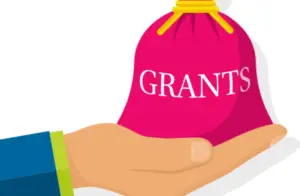Free personal grants appear to be a ray of hope in a society where limited resources sometimes impede individual development. Personal grants may empower people by giving them money for various needs, such as community initiatives, businesses, healthcare, and education.
This article explores the relevance of free personal grants and how they might help people’s lives change for the better.
Understanding Personal Grants:
Personal grants are sums of money given to people to meet particular needs or objectives; they are sometimes given without the need for return.
In contrast to loans, free personal grants are usually given out according to a set of standards, such as financial necessity, merit, or a goal specified by the giver. Personal grants frequently assist people who are pursuing training or education programs.
This might include funding for academic research, grants for vocational training, or scholarships for students needing financial assistance. Grants may be explicitly allocated to pay for wellness programs, therapies, or medical costs.
These funds enhance people’s well-being by facilitating access to essential healthcare services. Specific personal grants promote entrepreneurship by offering funds to launch new products, expand business, or develop products.
As a result, people are empowered to fulfill their dreams of becoming entrepreneurs. Funds for social initiatives, community initiatives, or environmental conservation efforts enable individuals to contribute positively to their communities. This promotes civic engagement and community development.
Types of Personal Grants:
- Merit-Based Grants: Awarded based on academic achievements, skills, or accomplishments.
- Need-Based Grants: Provided to individuals facing financial hardships or demonstrating significant financial need.
- Project-Specific Grants: Allocated for a particular purpose, such as research, community development, or arts and culture projects.
- Entrepreneurial Grants: Designed to support business ventures, product development, or innovation.
- Health and Wellness Grants: Aimed to cover medical expenses, promote healthy lifestyles, or address specific health-related needs.
Application and Selection Process:
Those interested in personal grants usually have to apply with a description of their plans, objectives, and justifications for needing financial aid.
The criteria established by the grantor determine how applications are chosen. A review committee evaluating applications following preset criteria can be involved. The grant is then given to the successful applicants, frequently with strict guidelines about how the money must be used.
Education as a Gateway:
Education is essential for individual and social growth, and personal grants are crucial in providing opportunities for those wanting to further their education.
The expense of schooling may be a significant barrier for many people. Personal grants serve as a lifeline for students who would otherwise be unable to pay for tuition, books, and other educational expenditures. Removing financial obstacles guarantees that education is available to a broader population, encouraging diversity and inclusiveness in educational environments.
Thanks to personal funding, individuals can take specialised courses that match their interests and professional ambitions, vocational training, or further education. This empowerment promotes lifelong learning and skill development across various areas beyond conventional academic pathways.
There are often disparities in access to high-quality education, with socioeconomic circumstances being a significant contributing element. Personal grants aim to close these gaps by giving money to people who might be underprivileged or disregarded.
Personal scholarships help create a fairer society where everyone can thrive equally by minimizing educational disparities. Merit-based personal awards encourage people to pursue academic success by recognizing and rewarding outstanding academic performance.
These funds enable people to pursue academic greatness, which helps the individual and raises standards in education as a whole. Personal subsidies for education help create an informed and skilled workforce. Consequently, this improves a country’s innovation and economic competitiveness.
Bridging Healthcare Gaps:
Healthcare is vital to well-being, but getting access to medical treatment may be extremely difficult for many people. This article explores the vital role that personal grants play in closing the healthcare gap, highlighting the lifeline these grants provide for those unable to pay for medical care.
Personal grants are essential in encouraging better health outcomes and the community’s general well-being since they cover costs associated with medical care, therapies, and wellness programs. Personal contributions to healthcare lessen the financial load of medical expenditures, prescription drugs, and required treatments.
These funds guarantee that people can obtain necessary healthcare treatments without jeopardizing their financial security by alleviating financial hardship. Medical treatments are frequently postponed or delayed due to healthcare shortages due to financial constraints—personal grants facilitate timely access to necessary medical interventions.
In addition to enhancing individual health outcomes, this access helps prevent and treat chronic illnesses. Initiatives that emphasize preventative healthcare measures, such as immunizations, screenings, and wellness programs, might be supported by personal donations.
These awards improve community well-being and lessen the overall load on healthcare systems by strongly emphasizing preventative healthcare. Socioeconomic variables are typically the root cause of health inequalities. By guaranteeing that people from all backgrounds have equal access to medical resources, personal grants for healthcare seek to eliminate these disparities.
Fostering Entrepreneurship:
Entrepreneurship is the engine of innovation, economic expansion, and job creation. However, ambitious business owners frequently encounter financial obstacles to realizing their ideas.
To shed light on how personal grants function as catalysts for transforming creative ideas into profitable companies, this essay examines the role of personal grants in promoting entrepreneurship.
Personal grants enable people to contribute to economic growth and innovation by offering financial assistance for company start-ups, product development, and entrepreneurial endeavors. For those who want to create their businesses, personal grants are an essential source of capital that may help them launch their projects.
Regardless of their financial situation, people may follow their business goals thanks to this empowerment, which fosters creativity.
Empowering Community Initiatives:
The cornerstone of society development is the implementation of community activities, which tackle regional issues and promote solidarity.
This article examines how personal donations might empower people to promote social causes, community projects, and environmental efforts. Personal grants enable individuals to positively affect their communities and promote social cohesion and collective well-being by offering financial support and resources.
Personal gifts are an invaluable funding source for community-driven projects, such as infrastructure development or cultural and educational endeavors.
Communities can carry out projects that improve their quality of life and meet particular needs thanks to this financial help. Personal grants promote civic participation by motivating people to engage actively in community-beneficial activities.
Conclusion
To sum up, free personal grants are an effective means of enabling people and promoting good change. These awards, whether used to promote community activities, business, healthcare, or education, can dismantle obstacles and open doors to individual and social growth.
There is an increasing possibility of establishing a more equitable and inclusive society where everyone has the opportunity to prosper as long as governments, organizations, and donors continue to acknowledge the significance of individual gifts.

